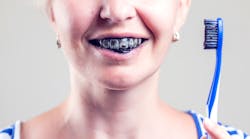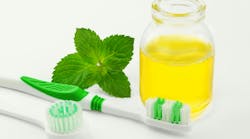Coconut oil as an adjunct oral therapy
Social media has become a popular source for oral health information. TikTok recently featured content about the benefits of oil pulling with coconut oil. We, two student hygienists from Pacific University School of Dental Hygiene Studies, investigated whther there’s evidence of coconut oil pulling benefits.
Research revealed that patients and health-care providers may not know the difference between oil pulling and using coconut oil as a supplementary therapy. The type of oil used (fractionated versus solidified coconut oil) can make a difference in the effectiveness of the therapy.1
What is oil pulling?
Oil pulling is an ancient Ayurvedic treatment that involves holding certain types of oil in the mouth for a specific amount of time. Oil pulling has been used for centuries to improve oral hygiene. Advocates claim that it can reverse tooth decay, eliminate bad breath, whiten teeth, promote overall health, and serve as an alternative to root canals.
Coconut oil is the oil most commonly used for oil pulling. However, a systematic review published in 2021 found that oil pulling was ineffective for improving oral health.2 Nonetheless, clinical studies have shown that the use of coconut oil can reduce plaque and gingival index scores without any of the adverse side effects that may be associated with chemical oral rinses.3
We interviewed Katharine Martinez, MPH, RDH, from Phoenix Children’s Hospital, who has firsthand experience using coconut oil as an adjunct therapy for patients. In patients with diminished care, there would be contraindications to oil pulling versus using oil as an adjunct therapy. For example, a stroke patient with a contraindication would have dysphagia issues. In those with cystic fibrosis, a contraindication would be that different bacterial or fungal elements can grow in oil, which could be detrimental to a CF patient’s ability to receive a lung transplant.
Oil can be used as an adjunct therapy for cancer patients experiencing mucositis or inflammation. Using oil can protect ulcerations from bacterial translocation and speed up wound healing. Coconut oil is an inexpensive option with minimal side effects for cancer patients experiencing xerostomia.4 The oil forms a coating in the oral mucosa and acts as a barrier.
Some evidence-based articles show that using coconut oil reduces the severity and pain of mucositis.5,6,7 Often, patients experiencing these symptoms are unable to handle chemical oral rinses. Coconut oil acts as a temporary relief. It is essential to weigh the pros and cons of using coconut oil as it cannot be used by anyone with a coconut allergy, cannot be used by anyone on oxygen, and should not be used by patients with dysphagia.
In our analysis of the literature, the success of the oil pulling method is dependent on the patient's ability to hold the oil in their mouth for a prolonged period, usually 15 minutes or more. This can be a limiting factor. Coconut oil may be a viable supplementary treatment option for patients with chronic diseases who have difficulty with self-care and who are seeking preventive therapy.
The effectiveness of treatment depends on the type of oil used. Solidified virgin coconut oil remains solid at room temperature and has undergone less processing, which preserves most of its fatty acids. Fractionated oil, on the other hand, is a liquid form of coconut oil where the different types of fat are separated. This is usually mixed with other ingredients and has a longer shelf life.
Most oil-pulling products on the market are made using fractionated oil. People often prefer fractionated coconut oil as it's more convenient to use and has a more pleasant taste. However, virgin oil retains more of its original properties as it is less processed than fractionated oil. Both oils are effective, but virgin oil is less processed and retains more of its original properties.
What we concluded
We caution future dental hygienists to be careful when talking to patients about oil pulling and using coconut oil as an adjunct therapy. Conduct a needs assessment to understand the advantages of oil pulling as a supplement to traditional oral hygiene treatments. Further studies are necessary to obtain evidence that supports a standardized oil-pulling treatment regimen. Be open to what patients use outside of their normal oral home care regimen, and use evidence-based data to support the information you share with them about oil pulling.
References
1. Rossell JB. Fractionation of lauric oils. J Amer Oil Chemists’ Soc. 1985;62:385-390.
2. Woolley J, Gibbons T, Patel K, Sacco R. (2020). The effect of oil pulling with coconut oil to improve dental hygiene and oral health: A systematic review. Heliyon. 2020;6(8):e04789. doi:10.1016/j.heliyon.2020.e04789.
3. Jia F, Jong X, Ooi DJ, Teoh SL. The effect of oil pulling in comparison with chlorhexidine and other mouthwash interventions in promoting oral health: A systematic review and meta-analysis. Int J Dent Hyg. 2024:22(1):78-94. doi:10.1111/idh.12725
4. Naseem M, Khiyani MF, Nauman H, Zafar MS, Shah AH, Khalil HS. Oil pulling and importance of traditional medicine in oral health maintenance. Int J Health Sci. 2017;11(4):65–70.
5. Saher F, Hosein M, Hasan A Qureshi J, Amber T, Sunderjee N. Effects of oil pulling on chemo-radiotherapy induced oral mucositis in head and neck cancer patients. J Pakistan Dent Assn. 2019;28.:3-12. doi:10.25301/JPDA.281.3.
6. Quimby AE, Hogan D, Khalil D, Hearn,M, Nault C, Johnson-Obaseki S. Coconut oil as a novel approach to managing radiation-induced xerostomia: a primary feasibility study. Int J Otolaryngol. 2020;8537643. doi:10.1155/2020/8537643
7. Kannan N, Asokan S, Gopal KR, Poddar S, Bhaumik A. June 3, 2021. Randomized controlled trial for comparative assessment of effect of artificial saliva versus virgin coconut oil on salivary proteolytic activity & radiation mucositis in patients undergoing radiotherapy for head and neck cancers. Malaysian J Med Health Sci. June 3, 2021. https://medic.upm.edu.my/upload/dokumen/2021061711360212_MJMHS_0271.pdf
Rose Nguyen BSDH(c), and Lisa Ng BSDH(c), are dental hygiene students at Pacific University School of Dental Hygiene Studies.
About the Author

Rose Nguyen BSDH(c), and Lisa Ng BSDH(c),
Rose Nguyen BSDH(c), left, and Lisa Ng BSDH(c), are dental hygiene students at Pacific University School of Dental Hygiene Studies. (2024)


